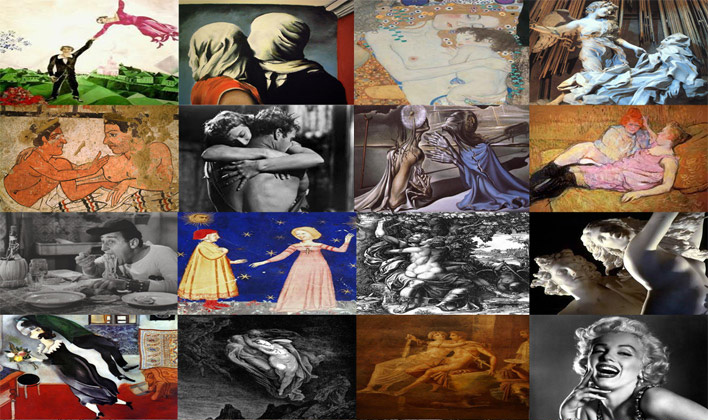Figures of desire and repression in the Conformist by Bertolucci
Abstract
Set during the Fascist era, the novel The Conformist (1951) by Moravia tells the story of Marcello, a member of OVRA obsessed by the need to feel equal to other people. It is a theory novel that links homosexuality to repression and fascism. The rewriting of Bertolucci (1970) reinforces the Freudian key: on the big screen, the iron temporal and causal progression of the novel is demolished by the free use of flashbacks, while any mention of fate disappears and Marcello becomes the filter of the entire narrative. Psychoanalysis is the keystone that holds up the film, replacing the mechanical progression of fate with the bi-logic of the unconscious.
To repress his homosexuality - not accepted by society but, first of all, by the protagonist himself - Marcello tries to conform in everything to society and the particular historical-political moment. Marriage and adherence to fascism are the two instruments of this conformism strategy; the female figures, in particular, play an essential role, through a game of duplication and reflections, taking shape as the subject of a real desire or instead of a desire mediated by the will of repression and denial of unacceptable impulses, unspeakable memories and sense of guilt.
In fact, playing with the image, editing and interference with sound, Bertolucci seems to suggest deep meanings which contrast with the surface of the text, and proposes a particular declination of the "Freudian rhetoric" of the text: referring to the critical psychoanalytic approach offered by Francesco Orlando, the essay investigates the semiotic-linguistic manifestations of compromise formation between desire and denial of the protagonist and analyzes moments of the film that reflect simultaneously the two psychic forces in conflict.
Downloads
References
Campani, Ermelinda M., L’anticonformista. Bernardo Bertolucci e il suo cinema, Fiesole, Cadmo, 1998.
Cappiabianca, Alessandro, “Lessico personale in un connettivo più vasto”, Filmcritica, 214 (1971): 154-156.
Casini, Simone “Introduzione a Moravia, Alberto”, I due amici, Milano, Bompiani, 2007: V-LXXIII.
Curi, Fausto, “Il corpo, il sesso. Per un’introduzione a Moravia”, Poetiche: rivista di letteratura, 10.1/2 (2008): 5-73.
David, Michel, La psicanalisi nella cultura italiana, Torino, Boringhieri 1966.
Freud, Sigmund, Das Unheimliche (1919); trad. it. “Il perturbante”, Opere complete, IX, Torino, Boringhieri, 1977.
Garbarino, Alessandro, “Il Conformista”, Rivista del Cinematografo, 7 (1971): 23-25.
Garofalo, Marcello, “L’Edipo simulato di Bertolucci”, Cinema studio, 2.2-4 (1991): 99-110.
Kidney, Peggy, “Bertolucci’s The Conformist: a study of the flashbacks in the narrative strategy of the film”, Carte Italiane: A Journal of Italian Studies. 7 (1985-1986): 47-56.
Kline, T. Jefferson, “The unconformist: Bertolucci’s The Conformist”, Modern European filmmakers and the art of adaptation, Eds. Andrew Horton – Joan Magretta, New York, Ungar, 1981: 222-237.
Kline, T. Jefferson, I film di Bernardo Bertolucci. Cinema e psicanalisi, Roma, Gremese, 1994.
Legrand, Gérard, "Les panneaux coulissants de Bertolucci", Positif, 129 (1971): 135-140.
Longobardi, Fulvio, Moravia, Milano, Il Castoro, 1967.
Lopez, Daniel, “Novel into Film: Bertolucci's The Conformist”, Literature/Film Quarterly, 4.4 (1976): 303-312.
Lopez, Daniel, “The Father Figure in The Conformist and Last Tango in Paris”, Film Heritage, 4 (1976): 1-11.
Lugnani, Lucio, Del Tempo. Racconto, discorso, esperienza, Pisa, ets, 2003.
Micciché, Lino, “Il Conformista”, Cinema italiano degli anni settanta, Venezia, Marsilio, 1989.
Morandini, Morando, “Il Conformista”, Cineforum, 99-100 (1971): 85-88.
Morandini, Morando, “Il conformista”, In viaggio con Bernardo. Il cinema di Bernardo Bertolucci, Eds. Roberto Campari - Maurizio Schiaretti, Venezia 1994: 64-73.
Morandini, Morando, “Bernardo lo schizoide”, Sipario, 229 (1971): 20-23.
Moravia, Alberto, “Folla e demagoghi”, Il popolo di Roma, 25 agosto 1943, Moravia 1980: 3-6.
Moravia, Alberto, “Irrazionalismo e politica”, Il popolo di Roma, 7 settembre 1943, Moravia 1980: 7-10.
Moravia, Alberto, La speranza, ossia cristianesimo e comunismo, Roma, Documento Libraio-Editore, 1944, Moravia 1980: 11-29.
Moravia, Alberto, Il conformista (1951), Milano, Bompiani, 1998.
Moravia, Alberto, “Il comunismo al potere e i problemi dell’arte”, Nuovi Argomenti, 1.1 (1953): 3-29, Moravia 1964: 159-186.
Moravia, Alberto, “L’uomo come fine”, Nuovi Argomenti, 2.11 (1954): 1-53, Moravia 1964: 193-248.
Moravia, Alberto, “L’erotismo in letteratura”, Nuovi Argomenti, 9.51-52 (1961), Moravia 1964: 357-360.
Moravia, Alberto, L’uomo come fine e altri saggi, Milano, Bompiani, 1964.
Moravia, Alberto, Impegno controvoglia. Saggi articoli, interviste: trentacinque anni di scritti politici, Ed. Renzo Paris, Milano, Bompiani, 1980.
Moravia, Alberto – Prezzolini, Giuseppe, Lettere, Milano, Rusconi, 1982.
Moravia, Alberto, “Breve autobiografia letteraria”, Opere. 1927-1947, Milano, Bompiani, 1986.
Moravia, Alberto, I due amici, Ed. Simone Casini, Milano, Bompiani, 2007.
O'Healy, Aine, “Re-envisioning Moravia: Godard's Le Mépris and Bertolucci's Il Conformista”, Annali d'Italianistica, 6 (1988): 148-161.
Orlando, Francesco, Per una teoria freudiana della letteratura, Torino, Einaudi, 1987.
Pecori, Franco, “La protezione della casa privata”, Filmcritica, 214 (1971): 157-158.
Peruzzi, Giuseppe, “Il Conformista”, Cinema Nuovo, 211 (1971): 210-211.
Prono, Franco, Bernardo Bertolucci: Il Conformista, Torino, Lindau, 1998.
Silva, Umberto, “La finzione dell’integrazione”, Filmcritica, 214 (1971): 158-159.
Storaro, Vittorio, Scrivere con la luce, Milano, Electa, 2001.
Tassone, Aldo, “Bernardo Bertolucci”, Parla il cinema italiano, Milano, Il Formichiere, 1980: II, 59-82.
Turroni, Giuseppe, “Cultura nel cinema o cinema della cultura”, Filmcritica, 214 (1971): 152-154.
Wagstaff, Christopher, "The Construction of Point of View of Bertolucci's Il Conformista", Italianist: Journal of the Department of Italian Studies, 3 (1983): 64-71.
Copyright Notice
You are free to copy, distribute and transmit the work, and to adapt the work. You must attribute the work in the manner specified by the author or licensor (but not in any way that suggests that they endorse you or your use of the work).









